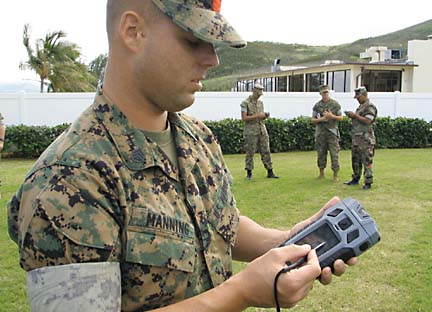
GREGG K. KAKESAKO / GKAKESAKO@STARBULLETIN.COM
Marine Staff Sgt. Chris Manning activates his Phraselator with a stylus. The device can translate English phrases into 55 languages and store the information on a data storage card.
Breaking the
language barrierTwo tools help Marines communicate
instantly in dozens of languages
The Marines have two types of universal voice translator devices to communicate with Iraqis about anything from searching vehicles to giving medical aid.
Shujie Chang, director of experimental projects at Marine Forces Pacific, said the devices are meant to help Marines who are now being sent to all corners of the world.
"You can take these devices," Chang said, "into any country and they are a means to communicate with the local population."
However, both voice translation devices are only one-way, where the commands or questions are made in English and then translated. Both rely on a pre-programmed lists of phrases.
The Phraselator P2 is the size of hefty personnel digital assistant, with a three-by-four-inch LCD display screen. It is manufactured by VoxTec, a subsidiary of Marine Acoustics Inc. in Newport, R.I.
The Voice Response Translator was developed 10 years ago for law enforcement officials and is basically a portable computer that attaches to a police officer's belt. It was designed, said Timothy McCune, president of Integrated Wave Technologies, to keep the hands of the police officer free.
The police officer would say a question or command into a microphone head set in English and the translator would broadcast a translation through a small speaker.
Joe Bryant, VoxTec's director of training, said the terrorist attacks of Sept. 11, 2001, pushed up the production of the Phraselator. The device had been developed as a joint $1 million project with the Department of Defense's Advance Research Project Agency and the Language and Speech Exploration Resources.
Both are the digital age's answers to the phrase books that were issued to GIs in past wars to help them communicate in a foreign country.
Phrases are pre-recorded by a native translator, Bryant said. VoxTec has translated phrases into 55 languages and the information is stored on a data storage card. About 15,000 phrases have been translated.
"However," Chang said, "the beauty of the system is that it can updated or changed on a need basis. It can be tailored to anyone's needs."
The unit has a one-watt speaker, but there is an audio-out plug on the side so it can be hooked up to an external speaker. It runs on rechargeable batteries or four AA batteries and weighs 20 ounces.
Bryant said the operator of the unit has three ways of communicating. Using a stylus he can pick a phrase by pointing to it or highlighting it and then activate it by pushing a button.
"Or he can just speak into it," Bryant said, "and the phrase will be repeated in the desired language."
Chang said each Phraselator cost $2,300 and the majority of the 350 allocated to Kaneohe Bay will be taken to Iraq and used by members of the 1st Marine Expeditionary Force.
"Another batch will be tested by the 3rd Marine Expeditionary Force during future training exercises in Okinawa and other places in the Pacific," Chang said.
More than 500 of them were shipped to Afghanistan in 2002 and were used by peacekeeping troops to communicate in Arabic, Urdu, Pashto, and Dari.
Army Sgt. Ignacio Betancourt, a member of the Pacific Command's civil military operations branch, said he has used an earlier version of the Phraselator in exercises in the Philippines.
"It was very useful when we had to direct people who had come to our aid station for medical assistance," Betancourt said. "There were so many of them and we used them to tell where to go.
"It also was invaluable in asking simple questions like 'Where does it hurt?'"
As Betancourt examined the latest Phraselator, he pointed out that controls of the newer models seem to have been modified for easier use.
"And the stylus is attached to the unit by a cord," Betancourt said. "That's nice. We kept losing them."
Chang said that each Voice Response Translator cost $2,800. The 100 units purchased will accompany Marines deploying to Iraq.
Like Phraselator, phrases used by the Voice Response Translator are stored on a data storage card which holds 125 languages and 125,000 phrases in each language. It was developed by John Hall, who designed the first electronic watch in 1970 and the first computerized heart pacemaker.
"It was designed where it would be miniaturized to fit in the shirt pocket of an officer, said McCune. "This design would provide law enforcement officers with a device capable of hands-free, eyes-free operations."
Lance Cpl. Jesse Kim, 20, said it took awhile to get use to talking distinctly into the microphone set that is part of the Voice Response Translator. "I wasn't speaking clearly enough," Kim said. "It takes awhile getting used to talking to a machine."
Bryant envisions commercial uses for the Phraselator in public safety, hospital care and education. "There is now a pilot project with the police department in Oneida County in New York," Bryant said, "as well as with the fire and hospital agencies in Maryland Washington, D.C."
